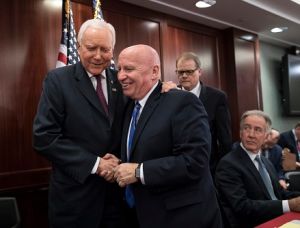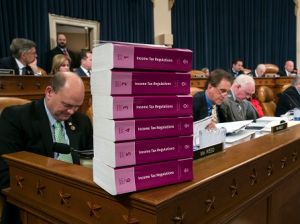Ample Tax Cuts For Business, Wealthy In New GOP Tax Accord

WASHINGTON (AP) — Generous tax cuts for corporations and the wealthiest Americans would be delivered in a sweeping overhaul of the tax laws, under a new agreement crafted by Republicans in Congress.
Middle- and low-income families would receive smaller tax cuts, though President Donald Trump and Republican leaders have billed the package as a huge benefit for the middle class. The agreement reached Wednesday by House and Senate GOP leaders also calls for scrapping a major tax requirement of the “Obamacare” health law, a step toward the ultimate GOP goal of unraveling the law.
The agreement combines key elements of separate tax bills recently passed by the House and Senate, striking compromises on some of them. The Republicans are pushing to deliver final legislation to Trump before Christmas as the first major legislative accomplishment of his presidency.
At the White House, Trump was eager to receive it. “The cynical voices that opposed tax cuts grow smaller and weaker, and the American people grow stronger, he said. “This is for people of middle income, this is for companies that are going to create jobs.
This is for very, very special people, the great people of America.”
The business tax cuts would be permanent, but reductions for individuals would expire after a decade — saving money to comply with Senate budget rules. In all, the bill would cut taxes by about $1.5 trillion over the next 10 years, adding billions to the nation’s mounting debt.
The legislation, still being finalized, would cut the top tax rate for the wealthiest earners — Trump among them — from 39.6 percent to 37 percent, slash the corporate income tax rate from 35 percent to 21 percent and allow homeowners to deduct interest only on the first $750,000 of a new mortgage.
The top tax rate currently applies to income above $470,000 for married couples, though lawmakers are reworking the tax brackets.
The standard deduction would be nearly doubled, to $24,000 for married couples.
Details of the agreement were described by Republican senators and congressional aides. They spoke on condition of anonymity because they weren’t authorized to publicly discuss private negotiations.
“It’s not my vision of the perfect, but again, this is definitely going to be a strong pro-growth tax package,” said Sen. Ron Johnson, R-Wis.
Republicans view passage of the legislation as a political imperative, proving to voters they can govern as the GOP fights to hold onto its majorities in the House and Senate in next year’s elections. Republicans say they expect the package to increase economic growth, generating additional tax revenue and lessening the hit to the $20 trillion budget deficit. Independent economists aren’t as optimistic.
Federal Reserve Chair Janet Yellen said Wednesday that she and her Fed colleagues, who set interest rate policy, expect a “modest lift” to economic growth from the tax package.
Negotiators have removed several controversial provisions from the tax bill, including one that would have eliminated the deduction for interest on student loans and another deduction for medical expenses, said two congressional aides. Also, the bill would no longer start taxing graduate-school tuition waivers, the aides said.
The tax bill would scale back the deduction for state and local taxes, allowing families to deduct only up to a total of $10,000 in property and income taxes. The deduction is especially important to residents of high-tax states like New York, New Jersey and California.
Business owners who report business income on their personal tax returns would be able to deduct 20 percent of that income.

The bill would repeal the mandate that most Americans get health insurance, a provision of the 2010 health care law. Republicans suffered a humiliating defeat this past summer when they were unable to dismantle the health care law after seven years of promises. Scrapping the individual mandate would provide them with more than $300 billion for deeper tax cuts while also undermining the Obama law.
Senate leaders plan to vote on the package next Tuesday. If it passes, the House would vote next.
“Let’s not waver now — let’s not give in to the Washington status quo — not when tax reform is so close,” Rep. Kevin Brady, R-Texas, chairman of the tax-writing House Ways and Means Committee, said at the start of the joint House-Senate conference committee’s first public meeting. The committee is charged with blending the tax bills passed by the House and Senate, though Republicans have done all their negotiations behind closed doors.
Full details will be unveiled by the end of the week, Brady said.
Democrats, who haven’t been included in any substantive talks on the bill, have assailed it as unfairly tilted in favor of business and the wealthy.
“This is the ultimate betrayal of the middle class,” Sen. Ron Wyden of Oregon, one of the Democratic conferees, charged at the meeting.
Once the plan is signed into law, workers could start seeing changes in the amount of taxes withheld from their paychecks early next year, lawmakers said — though taxpayers won’t file their 2018 returns until the following year.
The IRS said in a statement Wednesday that taxpayers could begin seeing less money withheld from their paychecks “as early as February.” The agency said it was taking initial steps to prepare withholding guidance for employers, which it expects to issue in January.
Corporate tax cuts would take effect in January, allowing businesses to immediately write off the full cost of capital investments.
___
Associated Press writers Kevin Freking and Ken Thomas contributed to this report.
Like BlackAmericaWeb.com on Facebook. Follow us on Twitter and Instagram
Sign Up For Our Newsletter!
(AP Photo/J. Scott Applewhite & AP Photo/J. Scott Applewhite)














